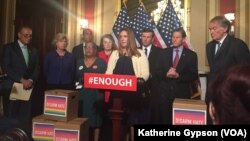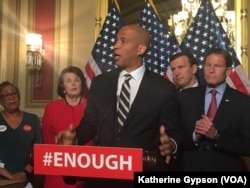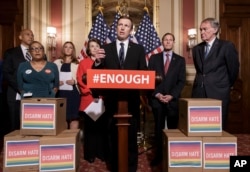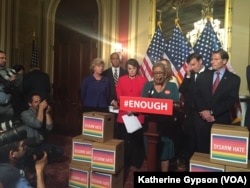Tina Meins talked to her father about terrorism and gun violence the weekend before he died.
"It sounds weird, but we really did that,” Meins said, smiling through tears as she recalled talking to her father about ways of preventing mass shootings, just days before he was one of 14 people killed in the San Bernardino, California, shooting last December.
The gunman who killed Meins’ father reportedly pledged allegiance to the Islamic State (IS) group shortly before the attack – just as the shooter did in the Orlando attack Sunday.
“I know exactly what those families were going through,” said Meins of the moment she heard the news. “The pain of knowing this was happening again in our country to so many families was too much to bear."
She thanked Connecticut Senator Chris Murphy, a Democrat, and several other senators who participated in an almost 15-hour filibuster on the Senate floor, demanding legislative action on gun control at a press conference Thursday.
The 40 Democratic senators who participated in the filibuster ended up winning a promise that legislation would come up for a vote, following a week of partisan congressional battles over ways to prevent future attacks like Orlando.
House Republicans countered that their vote Thursday on the Countering Terrorist Radicalization Act would do far more to address the threat of homegrown terrorism. That act consisted of three bills that had already passed the House and were packaged together to be passed along to the Senate in the wake of the Orlando shooting.
Senate Democrats’ legislation seeks to enhance background checks on gun sales and prevent individuals on the terror watch list from purchasing firearms.
Senator Dianne Feinstein – who sponsored one of those amendments – said she thinks the legislation can pass when it likely comes up for a vote next Tuesday. She said the Justice Department and the White House had called her to confirm their support for the bills.
White House spokesperson Eric Schultz said Thursday that Feinstein’s legislation “would make a substantive difference” but the president was “acutely aware of the political realities” involved in passing it.
Terrorism or gun control?
Any legislation will first have to survive the partisan battles of the U.S. Congress, where the Orlando shooting has been framed in two very different ways: as a national security issue by Republicans and a gun control issue by Democrats.
Senator John McCain, a Republican from Arizona, initially told reporters Thursday that Obama was “directly responsible” for the shooting in Orlando because he allowed the growth of IS during his presidency. In a later tweet, he clarified his statements to say the president’s national security decisions led to the rise of IS.
Former Republican presidential candidate Texas Senator Ted Cruz argued on the Senate floor Thursday afternoon that “this is not a gun control issue. This is a terrorism issue.”
"We saw a political show on the Senate floor. Democrat after Democrat standing on the floor, not incensed at ISIS, not incensed at radical terror, incensed that Americans have the right to keep and bear arms," Cruz said, using an acronym for the terror group. "This is a political distraction. This is political gamesmanship.”
Senate Democrats countered Republican framing of the issue as terrorism, arguing gun control legislation would be the best way to prevent future lone-wolf attacks.
“I think we’ve reached a tipping point,” Senator Ed Markey of Massachusetts said at the news conference Thursday. “I think everyone realizes the terrorists that we need to fear are not on the streets of Mosul or Aleppo or Fallujah. They’re on the streets of the United States and they will have guns unless we pass tough laws.”
On the House side, where members battled over a similar legislative proposal for gun control after a moment of silence Monday night, the conversation ran along the same lines.
House Speaker Paul Ryan of Wisconsin called for a balance between public safety and individual rights.
“We want to make sure that something like this never happens again, everybody wants that,” Ryan told reporters at a Thursday news conference.
“As we proceed, we also want to make sure we’re not infringing upon people’s legitimate constitutional rights – that’s important. We also want to make sure that somebody who is not supposed to get a gun, doesn’t get a gun. We have to figure out how that works," he said.
But House Minority leader Nancy Pelosi of California argued that Democrats have the will of the American people on their side.
“Eighty-seven percent of the American people say no fly-no buy, except for the Republican members of the Congress of the United States," Pelosi said.
"If they brought no fly-no buy and the background check bill to the floor, these would pass," she added.
Second Amendment concerns
But many Second Amendment supporters have expressed concern that the legislation would ignore the due process of the law and limit the rights of law-abiding gun owners.
“Seizing firearms from individuals and their God-given right to defend themselves is not going to prevent horrific acts of terror,” Representative Steve Russell, a Republican from Oklahoma, told VOA in an interview Wednesday. He owns a small rifle-manufacturing business.
Russell said the Democratic effort to enact gun control in the wake of the Orlando shootings was “a knee-jerk reaction where people are wanting to get solutions that are not going to address the problems.”
He said the nation’s connection to firearms goes back to its founding, when the colonists who fought for their independence made sure the right to bear arms was enshrined in the new Constitution.
But Meins, whose father was killed in San Bernardino, said it may be time to revisit those rights “written hundreds of years ago, those were different times.”
“People don’t understand that the ease of accessibility is really going to contribute to potential attacks,” she told VOA.
Meins said the filibuster effort to “closing the terror gap” and enhancing background checks would make a difference in helping prevent future attacks.
“People don’t understand the risk, especially in cases like Orlando and San Bernardino. I don’t think people understand the risk of homegrown terrorist attacks," she said.







